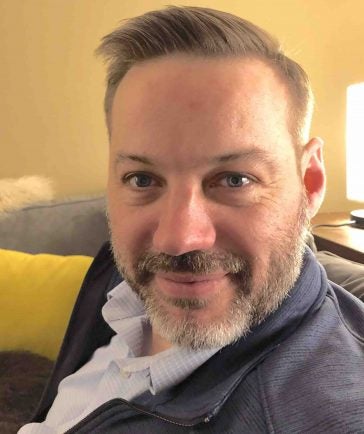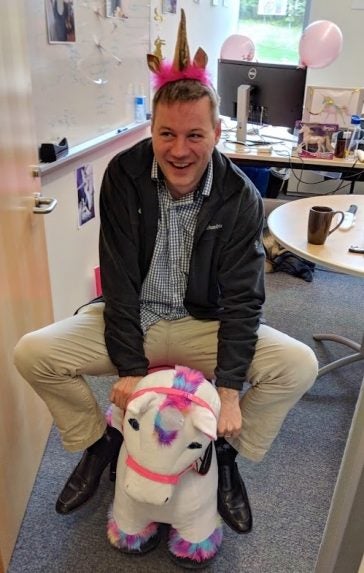By Neil Nachbar

Thomas Wenisch became interested in thermal management as an electrical and computer engineering undergraduate student in the German International Engineering Program at the University of Rhode Island.
Many years later, as a professor at the University of Michigan and an engineer at Google, he’s considered one of the leading experts in the subject.
“Hyperscale data centers, such as Amazon, Facebook and Google, consume enormous amounts of power, which produces megawatts of heat,” said Wenisch. “All the power going in as electricity comes back out as heat.”
Hooked on heat
Wenisch learned about the thermal management of data centers as a URI undergrad while doing an internship at American Power Conversion (now Schneider Electric) in West Kingston.
“I worked with a mechanical engineer to estimate how air and heat will move around a data center,” said Wenisch. “Some of my early work focused on how to reduce the power usage of the cooling infrastructure of data centers.”
Wenisch was equally enthusiastic about engineering in his classes at URI.

“Tom was one of the best students I ever had in my career,” said retired URI Professor Augustus Uht. “He was always answering the questions I posed to the class. At one point I had to stop him to give the other students a chance to answer.”
Wenisch’s love for academia ran in the family. His father, Fritz, was a professor of philosophy at URI for 48 years, serving as department chair from 1974 to 1991.
Improving energy efficiency
After earning his bachelor’s degrees from URI in 2000, Wenisch added a master’s degree and doctorate in electrical and computer engineering from Carnegie Mellon University.
Since joining the faculty of the University of Michigan in 2007, Wenisch’s research has focused on improving the energy efficiency of server systems in hyperscale data centers, among other topics.
“The main thrust of my work is figuring out how to get computer systems to either slow down or sleep effectively when they have less or no work to do,” said Wenisch. “Getting computers to take really short naps, for milliseconds, can save megawatts of power in the aggregate because of the scale of modern data centers.”
According to Wenisch, world-wide data center energy consumption accounts for about 3% of the world’s electricity.
“This is small relative to many other sectors of the economy, but it’s large in absolute terms and the share has been growing over the past two decades,” said Wenisch.
One of the fastest-growing sources of energy consumption in recent years is cryptocurrency.
“Bitcoin mining uses an enormous amount of energy,” Wenisch said. “The mining is basically done by solving math problems by trial-and-error. By finding the cryptographic key, the miner proves it did the work of searching for it. That trial-and-error process requires a lot of energy.”
Professional recognition
Wenisch was recognized for his contributions to energy efficient systems in June 2021 when the Association for Computing Machinery named the professor this year’s winner of the Maurice Wilkes Award.
The award is considered the most prestigious mid-career award in the computer architecture academic community.
“Many of the past recipients of this award have been sources of inspiration throughout my career,” said Wenisch, who is from Narragansett. “Maurice Wilkes was one of the giants of the early days of the computer revolution and a key pioneer that came up with the idea of stored program computers. It is great to receive an award that is affiliated with his legacy.”
In an acceptance video, Wenisch thanked his many mentors, including Uht.
“We couldn’t be prouder of him and are glad to have helped him on his way to success,” said Uht. “We recognized his hard work and potential when he was a student at URI.”
Industry experience
Since the 2019 academic year, Wenisch has been on leave from the University of Michigan. In that time, he’s worked as a senior software engineer at Google out of the company’s office in Madison, Wis.
“I lead several teams of engineers who build distributed systems in Google’s network infrastructure department,” said Wenisch.
Although he’s not currently teaching, Wenisch continues to operate a research program at the University of Michigan and advises doctoral students.
